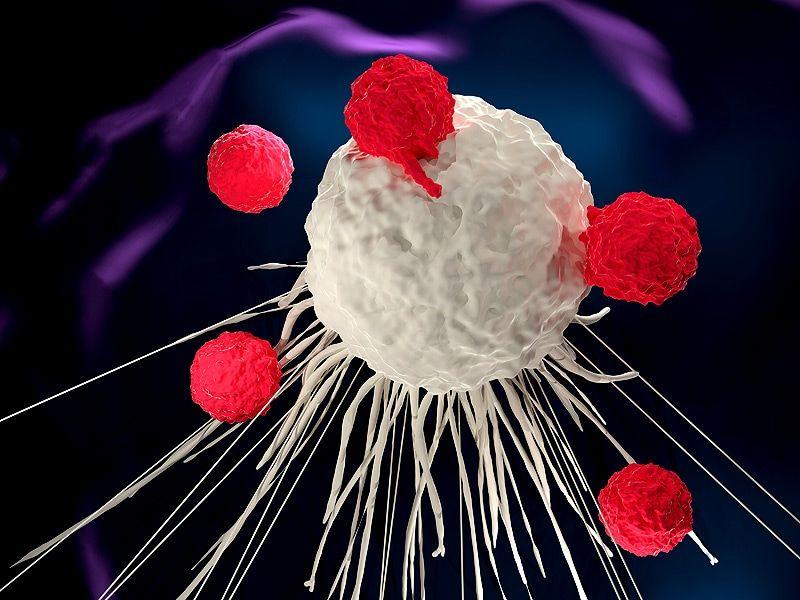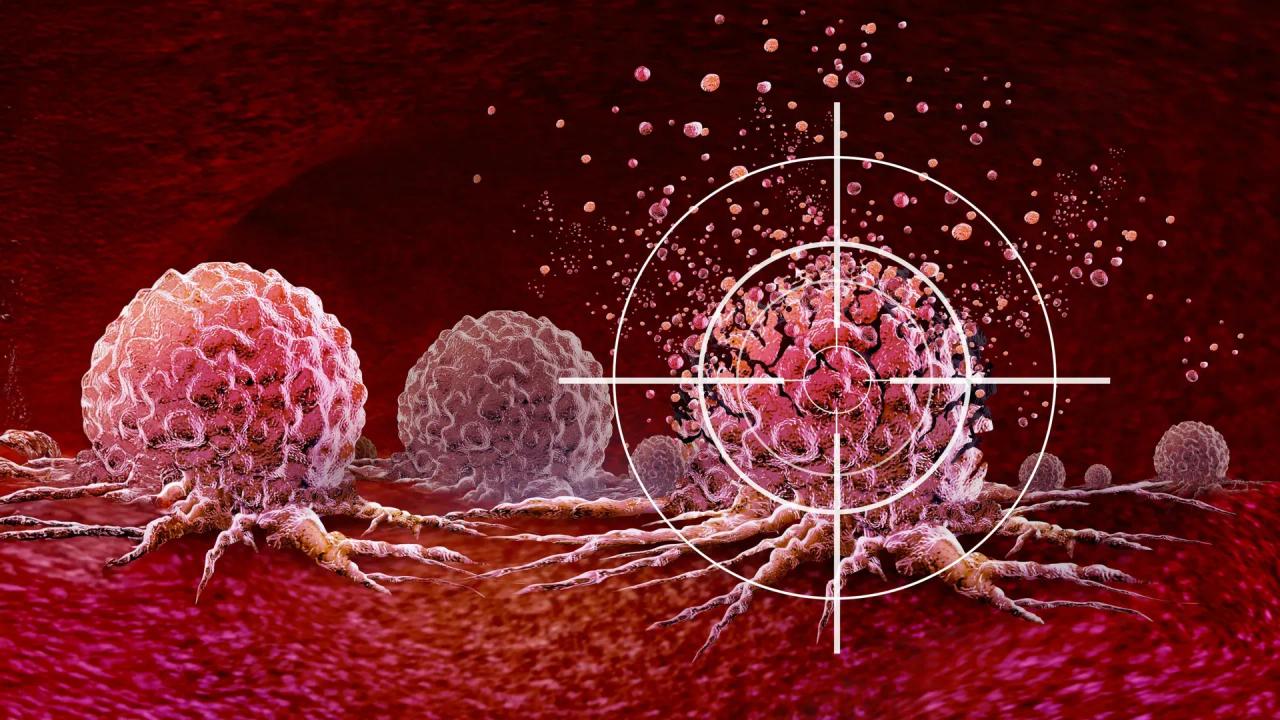Thymic Health: A New Frontier in Predicting Immunotherapy Success for Cancer Patients
3 Sources
3 Sources
[1]
Could Thymic Health Predict Immunotherapy Outcomes?
BERLIN -- The health of a cancer patient's thymus could be linked to survival outcomes with immunotherapy, regardless of the tumor type and independent of established tumor-based biomarkers, suggests an AI-based study. While it is known that the thymus decays with age, "this rate of decay is very different from person to person," said study author Simon Bernatz, MD, in his explanation of why the study was done, during his October 18 presentation of the results at the ESMO Congress 2025. Consequently, its relevance in adults is unclear, he continued. The research revealed that high thymic health was associated with a 37% lower risk for cancer progression and 44% lower risk for death among patients with lung cancer treated with immunotherapy, while further analysis indicated a similar response across tumor types. Thymic health was measured with standard CT scans. "This could be relevant because the patient's general adaptive immune system is currently not considered in clinical trials and in clinical practice," said Bernatz, MD, a radiology resident and research fellow at AI in Medicine (AIM), Mass General Brigham, Boston. Nevertheless, thymic health could "point to a novel paradigm in holistic medicine that we could potentially align to the patient," he said. "[W]e think thymic health is one of the missing pillars from current cancer biomarker panels and can start bringing the patient's immune system into clinical decision-making alongside established tumor-centered biomarkers," Bernatz added in a press release. During the meeting, Bernatz said: As T cells are matured in the thymus, and T cells drive the response to immunotherapy, the question then becomes: "Does a healthy thymus impact immunotherapy outcomes?" Bernatz said he believes one of the reasons why this question has yet to be answered fully is that a practical way of assessing the thymus in real-world settings was lacking. In attempting to address this, Bernatz and colleagues developed a novel AI-driven means of quantifying the thymus from CT scans. While an obviously healthy thymus can be easily distinguished from one that has completely decayed into fatty tissue, "the changes in between can be quite subtle and can be very hard for a radiologist to see and grade accurately," he added. Methods and Results To develop the AI model, the researchers used an independent dataset of more than 5000 individuals, with the algorithm locating the thymus, then extracting a range of different imaging features and combining them into one output, known as the thymic health score (range 0-100). Patients with a score in the lowest quartile were classified as having low thymic health, those in the top quartile as having high thymic health, and everyone in between as average thymic health. To independently evaluate the thymic health algorithm in clinical cohorts, they initially studied a non-small cell lung cancer dataset from Harvard of 1218 patients who had been treated with immunotherapy and followed-up for progression-free and overall survival. This showed that high thymic health was, in comparison with low thymic health, associated with a significant improvement in progression-free survival (PFS), at a hazard ratio of 0.63 (P < .001) after adjusting for sex, age, ECOG performance status, histologic subtype, PD-L1 status, and the treatment line and type. Patients with average thymic health also did better than their low health counterparts, at a hazard ratio of 0.69 (P < .001). Bernatz also reported similar findings for overall survival, with high thymic health associated with an adjusted hazard ratio for death of 0.56 vs low thymic health, while average thymic health was associated with a hazard ratio of 0.61 (P < .001 for both). Next, the team compared the performance of thymic health with that for PD-L1 status and tumor mutational burden (TMB), finding similar effect sizes for both PFS and overall survival. Further analysis demonstrated that thymic health was prognostic across PD-L1 and TMB subgroups, indicating that it is an independent biomarker. To examine the underlying biology of the impact of thymic health, Bernatz said the investigators turned to the TRACERx study, using blood-based assessments to show that higher thymic health was linked to higher thymic output, higher diversity of the T-cell receptor, and a higher T-cell fraction in the blood. Finally, the researchers leveraged data on 2258 Harvard patients with a range of tumors, including melanoma, breast cancer, kidney cancer, bladder cancer, esophageal cancer, and other cancers. They found "very similar and consistent results across all these different tumor types." This suggested a pan-cancer impact of thymic health on immunotherapy outcomes, Bernatz said. Research Moves Beyond Traditional Tumor-Intrinsic Predictors to a Host-Immune Biomarker The study has several strengths, according to Samra Turajlić, MD, PhD, director of Cancer Research UK Manchester Institute, and a consultant medical oncologist at the Christie NHS Foundation Trust, Manchester, UK. In a discussion of the analysis, she said it moves beyond traditional tumor-intrinsic predictors to a host-immune biomarker, and "the other compelling thing about this is [it relies on] a routinely acquired piece of data in clinic" that relates to PFS and overall survival outcomes. It also conceptually reframes the notion of immune aging as a modifiable, or at least quantifiable, aspect of immune-oncology, noted Turajlić, who was not involved in the study. Questions and Limitations Related to New Research Remain There remain a number of open questions, Turajlić underlined. The first being that of causality vs correlation in terms of whether thymic atrophy causes reduced immunotherapy responses or simply correlates with aging, she said. The association between thymic health and outcomes may also be confounded by prior therapies, steroids, radiation therapy, infections, BMI, and comorbid conditions, she said. Moreover, age was included in the analysis, but perhaps immunobiological age could be captured and may have an impact. Turajlić said she wondered whether changes in thymic health track with disease relapse and emergent immunotherapy resistance, or immune-related adverse events. Finally, there is a question mark over the basis of tumor histology-specific responses to immunotherapy, she said. There are a number of next steps needed to be taken to validate thymic health as a biomarker, Turajlić suggested, including benchmarking against measures of immune fitness, such as lymphocyte count and conducting a prospective study controlling for tumor histology and the type and combination of immunotherapy uses. Turajlić also wondered if imaging studies could consider immunity more broadly, perhaps by looking at changes in lymph nodes, the spleen, and bone marrow. "The main limitation of the finding is that it has not been validated prospectively," said Alessandra Curioni-Fontecedro, MD, professor of oncology at the University of Fribourg, Switzerland, in the press release. Curioni-Fontecedro was not associated with the research. She did note, however, that the inclusion of a validation cohort added to the study's quality, and said that while thymic health is not routinely assessed, chest CT scans are commonly performed in patients with cancer. "Randomized clinical trials will be needed to establish this in clinical practice," Bernatz stated in the press release. The authors received financial support from the National Institutes of Health and the European Union - European Research Council. The study was partially funded by Deutsche Forschungsgemeinschaft (DFG, German Research Foundation). Bernatz declared relationships with Ambient, Inc, German Research Foundation, DFG. Other authors also declared numerous relationships. Curioni-Fontecedro disclosed relationships with Amgen, AstraZeneca, Boehringer Ingelheim, Bristol-Myers Squibb, Daichii Sankyo, Janssen, Medscape, Merck Sharp & Dohme, Roche/Genentech, Takeda, and Foundation Medicine. Turajlić declared no relevant relationships.
[2]
Thymic health found to predict immunotherapy success in cancer patients
European Society for Medical Oncology (ESMO)Oct 16 2025 The health of the thymus - a key part of the body's immune system - is associated with cancer patients' outcomes to immune checkpoint inhibitor treatment, according to a ground-breaking international study reported at ESMO 2025. Immune checkpoint inhibitors have transformed cancer treatment, but responses remain limited in some patients." Dr. Simon Bernatz, lead author of the AI in Medicine Program at Mass General Brigham, Boston, USA He noted that current biomarkers for immunotherapy, such as PD-L1 or tumor mutational burden (TMB), focus on tumor characteristics but largely overlook patients' immune capacity. The new study investigated whether thymic health might be associated with response to immunotherapy by analysing routine chest CT scans from nearly 3500 real-world patients treated with immune checkpoint inhibitors. Using an AI tool based on a deep learning framework developed to carry out multi-layered analysis of data from CT scans, researchers assessed thymic size, shape and structure to score thymic health, and examined how these scores related to patients' outcomes with immunotherapy. Results showed that higher thymic health was associated with a 35% lower risk of cancer progression (hazard ratio [HR] 0.65; 95% confidence interval [CI] 0.54-0.77) and 44% lower risk of death (HR 0.56; 95% CI 0.46-0.68) in the group of just over 1200 patients with non-small cell lung cancer included in the study. There was also a positive association between thymic health and immunotherapy outcomes in patients with other cancers, including melanoma, renal and breast cancers. A further part of the study confirmed that the deep learning analysis of CT scans provided a valid proxy for thymic health. The researchers sequenced T-cell receptors and their associated proteins in a sub-group of 464 patients with non-small cell lung cancer. This gave detailed information on T cell differentiation and function; the results correlated with thymic health as assessed using the new AI tool for analysing CT scans. "Immunotherapy relies on unleashing T cells and the thymus is where T cells are matured. Our study shows that thymic health is associated with improved immunotherapy outcomes across diverse cancer types," explained Dr Bernatz. Looking to the future, he believes the findings suggest that thymic health could serve as a non-invasive biomarker of adaptive immune competence in a range of different cancers. "Thymic health has the potential to enhance patient stratification in precision oncology," he suggested. "Randomised clinical trials will be needed to establish this in clinical practice. But we think thymic health is one of the missing pillars from current cancer biomarker panels and can start bringing the patient's immune system into clinical decision making alongside established tumor-centred biomarkers." "The main limitation of the finding is that it has not been validated prospectively. We need a prospective study including evaluation of thymic health in patients undergoing immunotherapy," said Dr Alessandra Curioni-Fontecedro, Professor of Oncology at the University of Fribourg, Switzerland, not involved in the study. However, she noted that the inclusion of a validation cohort added to the study's quality and that, although thymic health is not routinely assessed, chest CT scans are commonly performed in patients with cancer. "There are many reasons why we need new biomarkers for immunotherapy in cancer patients," Curioni-Fontecedro suggested. "In lung cancer, we need biomarkers to guide whether to give patients immunotherapy alone or in combination with other treatments, such as chemotherapy. And we need better biomarkers for prognosis in individual patients." European Society for Medical Oncology (ESMO)
[3]
Cancer patients' thymic health is linked to their response to immunotherapy
In cancer patients, the health of the thymus -- a key part of the body's immune system -- is associated with the outcomes these patients experience after immune checkpoint inhibitor treatment, according to an international study reported at ESMO 2025. "Immune checkpoint inhibitors have transformed cancer treatment, but responses remain limited in some patients," said lead author Dr. Simon Bernatz, of the AI in Medicine Program at Mass General Brigham, Boston, U.S. He noted that current biomarkers for immunotherapy, such as PD-L1 or tumor mutational burden (TMB), focus on tumor characteristics but largely overlook patients' immune capacity. The new study investigated whether thymic health might be associated with response to immunotherapy by analyzing routine chest CT scans from nearly 3,500 real-world patients treated with immune checkpoint inhibitors. Using an AI tool based on a deep learning framework developed to carry out multi-layered analysis of data from CT scans, researchers assessed thymic size, shape and structure to score thymic health, and examined how these scores related to patients' outcomes with immunotherapy. Results showed that higher thymic health was associated with a 35% lower risk of cancer progression (hazard ratio [HR] 0.65; 95% confidence interval [CI] 0.54-0.77) and 44% lower risk of death (HR 0.56; 95% CI 0.46-0.68) in the group of just over 1,200 patients with non-small cell lung cancer included in the study. There was also a positive association between thymic health and immunotherapy outcomes in patients with other cancers, including melanoma, renal and breast cancers. A further part of the study confirmed that the deep learning analysis of CT scans provided a valid proxy for thymic health. The researchers sequenced T-cell receptors and their associated proteins in a sub-group of 464 patients with non-small cell lung cancer. This gave detailed information on T cell differentiation and function; the results correlated with thymic health as assessed using the new AI tool for analyzing CT scans. "Immunotherapy relies on unleashing T cells and the thymus is where T cells are matured. Our study shows that thymic health is associated with improved immunotherapy outcomes across diverse cancer types," explained Dr. Bernatz. Looking to the future, he believes the findings suggest that thymic health could serve as a non-invasive biomarker of adaptive immune competence in a range of different cancers. "Thymic health has the potential to enhance patient stratification in precision oncology," he suggested. "Randomized clinical trials will be needed to establish this in clinical practice. But we think thymic health is one of the missing pillars from current cancer biomarker panels and can start bringing the patient's immune system into clinical decision making alongside established tumor-centered biomarkers." "The main limitation of the finding is that it has not been validated prospectively. We need a prospective study including evaluation of thymic health in patients undergoing immunotherapy," said Dr. Alessandra Curioni-Fontecedro, Professor of Oncology at the University of Fribourg, Switzerland, who was not involved in the study. However, she noted that the inclusion of a validation cohort added to the study's quality, and that although thymic health is not routinely assessed, chest CT scans are commonly performed in patients with cancer. "There are many reasons why we need new biomarkers for immunotherapy in cancer patients," Curioni-Fontecedro suggested. "In lung cancer, we need biomarkers to guide whether to give patients immunotherapy alone or in combination with other treatments, such as chemotherapy. And we need better biomarkers for prognosis in individual patients."
Share
Share
Copy Link
A groundbreaking AI-based study reveals that the health of a patient's thymus could be a key predictor of immunotherapy outcomes across various cancer types, potentially revolutionizing cancer treatment strategies.

AI Study Unveils Thymic Health as Predictor of Immunotherapy Outcomes
A groundbreaking international study presented at the European Society for Medical Oncology (ESMO) Congress 2025 has revealed that the health of a cancer patient's thymus could be a crucial factor in predicting the success of immunotherapy treatments
1
2
. The research, led by Dr. Simon Bernatz from the AI in Medicine Program at Mass General Brigham, Boston, utilized artificial intelligence to analyze routine chest CT scans and assess thymic health in cancer patients.The Thymus: A New Focus in Cancer Treatment
The thymus, a key component of the body's immune system responsible for T cell maturation, has long been overlooked in adult cancer patients. However, this study suggests that thymic health could be a missing piece in the puzzle of immunotherapy efficacy
1
. The researchers developed an AI-driven method to quantify thymic health from CT scans, assigning scores ranging from 0 to 100 based on various imaging features1
.Significant Findings Across Cancer Types
The study, which analyzed data from nearly 3,500 patients treated with immune checkpoint inhibitors, found that higher thymic health was associated with improved outcomes across various cancer types
2
3
. In non-small cell lung cancer patients:- 35% lower risk of cancer progression (HR 0.65; 95% CI 0.54-0.77)
- 44% lower risk of death (HR 0.56; 95% CI 0.46-0.68)
Similar positive associations were observed in patients with melanoma, renal, and breast cancers
2
.Validation and Biological Basis
To validate their findings, the researchers conducted a deeper analysis on a subgroup of 464 non-small cell lung cancer patients. They sequenced T-cell receptors and associated proteins, confirming that the AI-assessed thymic health correlated with T cell differentiation and function
2
3
.Related Stories
Implications for Cancer Treatment
Dr. Bernatz suggests that thymic health could serve as a non-invasive biomarker of adaptive immune competence across various cancer types. This finding has the potential to enhance patient stratification in precision oncology and bring the patient's immune system into clinical decision-making alongside established tumor-centered biomarkers
1
2
.Future Directions and Limitations
While the study's findings are promising, Dr. Alessandra Curioni-Fontecedro, Professor of Oncology at the University of Fribourg, Switzerland, notes that prospective validation is needed
2
3
. Future research may focus on using thymic health as a biomarker to guide treatment decisions, such as whether to administer immunotherapy alone or in combination with other treatments like chemotherapy.References
Summarized by
Navi
Related Stories
AI Tool SCORPIO Predicts Cancer Immunotherapy Response Using Routine Blood Tests
07 Jan 2025•Health

AI Tools Enhance Detection of Immune Structures in Melanoma, Improving Survival Predictions
25 Apr 2025•Science and Research

AI Models Show Promise in Predicting Triple-Negative Breast Cancer Prognosis
19 Nov 2024•Health

Recent Highlights
1
Anthropic releases Claude Opus 4.6 as AI model advances rattle software stocks and cybersecurity
Technology

2
French Police Raid X Office as Grok Investigation Expands to Include Holocaust Denial Claims
Policy and Regulation

3
Prima AI model reads brain MRI in seconds with 97.5% accuracy, transforming neurological diagnosis
Health




